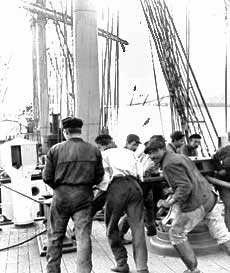Everett Darling
Paper 5, Hobson, Very Rough
AUTHORS APPROACH TO THEIR OWN BIASES
> "Like most scholars, I have endeavored to examine the available material with a minimum of preconceptions and personal prejudices, but the lessons of the past indicate that any individual's work is always influenced, consciously or unconsciously, by the environment in which his or her intellect developed." (Malloy, 4)
>"Unfortunately, it is virtually impossible with any available documents to reverse the roles and place Yankee sailors under the microscope of Northwest Coast Indian scrutiny in the early nineteenth century." (Malloy, 3)
>"Here I paint a different picture that reveals, if not a Sinocentric global economy, then certainly one in which China played a major role in the post-1434 period." (Hobson, 51)
Can one be completely aware of their biases? And if one is aware, why not look to rectify this problem by amending something, such as your research methods, or find ways to rethink your lack of alternative perspective?
Is the very nature of academic research unwilling to make allowances for a non-thesis based paper, one in which several stories are told where "fact" is multi-dimensional?
Can two contradictory truths appear side by side and be equally as valid as the other?
HOBSON'S EUROCENTRIC OBSESSION AND PROCLIVITY FOR OVERSIMPLIFIED DUALISMS
>"In contrast to the Eurocentric depiction of the Chinese state..."(55)
>"While Eurocentrism depicts the Chinese economy as....the fact is that,"(55,56)
>"For Eurocentric scholars..."(71) The first problem with the Eurocentric dismissal is...."(71) Eurocentric scholars have been ....(70) Many Eurocentric scholars have...(67) Eurocentrism dismisses the possibility that....(62) Nevertheless, Eurocentric scholars point to..."(94) Eurocentric scholars view European mercantilism..."(93)
"Hobson spends an enormous amount of time debunking another perspective, but how much time is he spending countering an argument, instead of backing up his thesis? There is an either/or air to his argument, either you are Sinocentric, or you're Eurocentric, and of course the latter is based on bad information and misinterpretations, which just so happens to be the polar opposite of his argument."
>"It could probably be safely said that the Chinese were the greatest sailors in history."(58)
"Probably...safely", seems like a bit of a contradiction, If you are going to say something, say it, stop pussyfooting around the issue. But let's quantify this more; what makes any group great sailors? Can we challenge the way we think about "great,"? Can we think of "great" beyond sailing techniques and ship design? What about exploration, uses of available technology, oppurtunistic trade techniques, excellent use of navigational aids, well-documented journeys, exploitative practices leading to domination, etc... What does this superlative and its use do to the author's argument? I think that the answer is that it further polarizes a more complex topic.
I feel rather beffudled right now, and I would rather not have you see this, but 'tis protocol and all, so here it is. If you can inspire me, please do so! Also if you have specific examples of author's addressing their biases in any text we've read, I would appreciate the added ammunition for my tiresome tirade. Anyway, happy May Day.
xo
Everett
